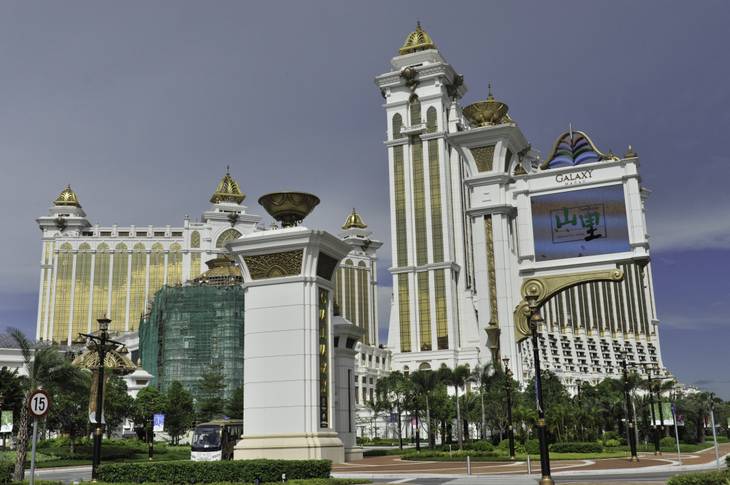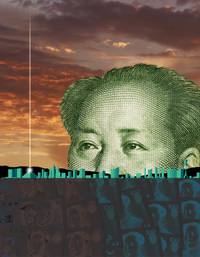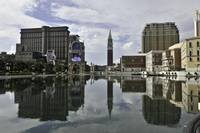About baccarat
- Baccarat, penny slots overtake blackjack as games of choice on Strip (March 15, 2011)
- Casinos on guard against tech-savvy baccarat ring (Feb. 2, 2011)
- Caesars Palace to pay $250,000 over baccarat player’s table walk (Aug. 26, 2011)
First of two parts: Next week: Reporter Richard N. Velotta travels to Macau to examine how Las Vegas has shaped the hottest gambling center in the world.
The story behind why baccarat has rocketed past craps, roulette and blackjack to become Nevada’s highest-grossing table game begins and ends thousands of miles away in China, home to some of the world’s most prolific gamblers.
More specifically, it centers on a peninsula on the doorstep of mainland China with a history of gambling stretching back more than a century. Macau, the only place in China where casinos are legal, is the site of a resort gold rush sparked by the opening of the market to foreign competition in 2002. With a dozen casino resorts built in just seven years, the region has accomplished in less than a decade what took more than 50 years in Las Vegas. Baccarat, the game favored by high-rolling Chinese gamblers, has fueled that boom and generated a ripple effect on the Las Vegas Strip, where such gamblers congregate in the United States.
Baccarat players wagered a record $10.7 billion last year on the Strip, a 24 percent increase from 2009 and amid an economic downturn. That was about 17 percent of all wagering on slots and other casino games last year, a share that has grown since Las Vegas operators have built versions of their resorts in Macau.
Those are table crumbs compared with the baccarat action in Macau. Its $23.4 billion in gambling revenue last year, mostly from baccarat, was twice that of Nevada’s, and it is three times what Nevada generated through June this year.
The surge in baccarat revenue is the one major effect that Macau and its exponential casino growth have had on Las Vegas, now running a distant second to the Chinese enclave in gambling volume and profits.
Otherwise, the emergence of Macau as the world’s gambling leader seems little known or seen in Las Vegas, where gambling accounts for a minority of Strip revenue and is increasingly taking a back seat to other forms of entertainment.
Just how profitable Chinese high-rollers are for Las Vegas is also uncertain, as catering to high-rollers is a risky—and expensive—enterprise.
Much as the spread of casinos across the United States helped build interest in Las Vegas, Macau is expected to benefit Las Vegas and Nevada more than its luring away high-rollers will harm us. Still, the emergence of an Asian version of Las Vegas presents a double-edged sword for operators of luxury resorts here that aim to keep their biggest customers as close as possible to the gambling action. And it presents new challenges for Western companies accustomed to a different money culture than is the norm in China.
Las Vegas resorts have long capitalized on the Asian propensity to gamble by employing casino hosts well-versed in Asian culture to travel the globe cultivating customers.
Still, the recent baccarat boom is more about being in the right place at the right time than the result of an aggressive marketing push by Las Vegas resorts to court Chinese gamblers.
VEGAS INC archives
Relationship between Las Vegas, China runs deep (Sept. 19, 2011)
Rather than focusing on bringing gamblers here, Las Vegas giants rushed to export their product to Macau, which before Western-owned megaresorts had been viewed as a seedy gambling town.
The three Las Vegas casino giants granted licenses to operate in Macau have opened six resorts, and more are being built. Those operating in Macau the longest, Las Vegas Sands and Wynn Resorts, have effectively become Chinese companies in that most of their earnings are generated in Asia.
Despite the money to be made from Chinese high-rollers and their disproportionate contribution to the state’s tax coffers, no public marketing effort in recent years has targeted them. No signs in Chinese welcome tourists at McCarran International Airport. Chinese characters, along with other foreign languages, are absent from the prominent signage at Las Vegas resorts. That puts Las Vegas behind other tourist destinations, especially hotels and other amenities near national parks popular with Europeans and Asians.
Nor have casinos gone on a hiring binge for Chinese-speaking hosts and other casino employees who could better attract such coveted gamblers and converse with them.
Outside of Chinese New Year, which attracts crowds for Chinese-themed events and entertainment, the influx of Chinese gamblers often falls under the radar in Las Vegas.
Asian gamblers prefer high limits and hot tea to the smaller stakes, cocktails and party atmosphere that dominate the Las Vegas scene. The Chinese style of gambling is serious transaction with symbolic significance, in contrast to the more casual carnival that unfolds outside the sequestered baccarat pit.
With the exception of Asian gaming pits and restaurants at several casinos and the Asian-inspired décor at Wynn Las Vegas and Encore, there’s little to indicate the importance or influence of Asia to the average Las Vegas tourist.
High-rollers play in sequestered rooms away from the casino floor or behind closed doors. Encore, Venetian and Palazzo offer little-known upstairs casinos reserved for high-rollers—mostly Asians who prefer to gamble privately.
Such attempts fall short of the anonymity offered players in Macau, where most gambling occurs behind closed doors in VIP rooms. Casino operators in Macau rent space in their casinos to third parties that run the games and issue credit to players.
“A lot of these high-rolling Chinese gamblers don’t want people to know they’re rich,” said Roger Shaw, executive vice president and corporate product group chairman for Shuffle Master, which is based in Las Vegas and does business in Macau. “They don’t want to be known at all.”
To compete with places such as Macau that allow private gambling, Nevada changed state law in 2001 to allow casinos to reserve private rooms for high-rollers only if Gaming Control Board agents can monitor the action remotely. Previously, all gambling had to be accessible to the public. Since it opened, Wynn Las Vegas has expanded its baccarat area, and Caesars Palace is building four private gaming salons.
Some gamblers further hide their play in Macau by making unseen side bets based on the amount they wager at the table. A $100 bet, for example, might actually be a $1,000 or $10,000 bet between the gambler and a “junket operator,” who will pay the gambler on the side if he wins or collect against his debt if the gambler loses. While it’s unknown whether such underground betting occurs in Las Vegas, it’s a known phenomenon in Macau, where some observers say millions in gambling proceeds go uncollected and untaxed.
Still, gambling in Macau is only going in a single direction.
Gambling revenue in Macau hit a monthly record of about $3 billion in August, a 57 percent increase from a year ago, when revenue rose 40 percent. That’s after the debut of Galaxy Macau by Union Gaming Group, which has forecast a 43 percent increase in gambling revenue this year and another increase of at least 20 percent in 2012.
The increase in baccarat revenue on the Strip can be explained only by efforts, however limited, to lure Chinese players to Las Vegas, experts say.
With Macau’s 40 percent tax on gambling revenue dwarfing Nevada’s rate of 6.75 percent, the lowest of any gambling state, Nevada’s gaming companies have an incentive to attract key customers. Among the lures: a classic Vegas experience, which includes a lengthier stay at the casino than the gambler is accustomed to in Macau and the on-the-house pampering for which Las Vegas is known.
Efforts to bring high-rolling gamblers cultivated from sister properties in Macau to Las Vegas has worked “to some degree,” said Bill Lerner, an analyst and principal with Union Gaming Group, which has offices in Macau and Las Vegas.
“Some portion of these players have found their way to Vegas by virtue of the Vegas operators doing business” in China, Lerner said.
Although their corporate chieftains are reticent about discussing high-roller-business, resort employees say they are seeing Las Vegas’ increasing dependence on high-rolling Chinese first hand. While business from deep-pocketed Americans has declined in the depressed economy, Chinese gambling money — driven by growing companies run by ethnic Chinese across Asia — is on the rise, they say.
With the U.S. economy in turmoil, these Asian big spenders with an itch to gamble are helping to keep some casinos afloat, they say.
“The bulk of the big money is coming from China. We’re competing more for those players but the number of players and the money are getting bigger,” one employee involved in high-limit gaming said.
Getting them here isn’t easy, however. A small number of visa offices in China and lengthy wait times for U.S. travel visas from China mean monthly wait times for gamblers seeking to try their luck in the United States. For those who secure visas, getting here can mean a day lost to travel, including stopovers at major hubs such as Los Angeles before getting the VIP treatment on a casino’s private jet and a limo to the high-roller suite.
As a result, experts say the $10.7 billion wagered on baccarat last year primarily stems from a select group of Asians for whom a trip to Las Vegas represents a new kind of gambling status in an exotic locale.
Such players may visit just once or twice a year with their families in conjunction with a special event they couldn’t otherwise get at home, such as a title fight, concert or tournament. Some Las Vegas casinos have booked Asian singers whose shows sell out in their home countries, making their acts a hot ticket for Asians who might not otherwise get the chance to see them. Still, such attractions are secondary to the primary goal of gambling, which is more easily accessible to the Chinese in Macau.
“The other amenities may be important to the gambler’s wife and entourage but not to him,” said Bill Eadington, an economics professor and director of the Institute for the Study of Gambling and Commercial Gaming at UNR, who has traveled extensively across Asia.
“For a lot of Asian gamblers, the real purpose is to play the game and meet destiny.”
Although the Chinese high-roller may view Las Vegas as a prestige destination, there’s little need to frequent it, Shaw said.
“They’re not here for shows or entertainment, they like the food better over there (in Macau) because it’s true Chinese food, and they’ll book bigger (gambling) action there than they will here,” Shaw said. Even so, he added, Chinese will make the occasional trip to experience the West.
“Chinese people are fascinated by all things Western,” he said. “They buy Italian and French handbags and Swiss watches and they watch American movies. Las Vegas is an iconic American city for a lot of Asians, especially if you’re a gambler. But people going to Macau on a regular basis are not coming here.”
Las Vegas casino companies have lobbied Congress to speed up the visa process in China and other countries with similarly cumbersome travel restrictions. And the three with Macau casinos are focusing their energy on the path of least resistance — boosting the record profits they generate in Macau by keeping those gamblers close.
Bearing striking resemblance to their sister properties in Las Vegas, the lavish resorts built by Sands, Wynn and MGM Resorts International in China aren’t pit stops on the way to Las Vegas but rather, palaces for pampering gamblers closer to home.
At first blush, it makes financial sense for Las Vegas casinos to divert as much of the Chinese gambling action as possible to Las Vegas. Rather than getting a fraction of the high-roller action as they do in Macau by virtue of sharing the business with junket operators and paying higher taxes, Las Vegas operators transact with their gamblers directly, including issuing them credit or no-interest loans with which to gamble.
Still, doing business with Chinese high-rollers presents a special risk for Las Vegas casinos, making their Macau operations all the more attractive, said Bill Zender, a casino consultant and former Nevada regulator.
Chinese gamblers are accustomed to paying junket operators a high rate of interest, generally 10 percent a week, on their gambling debts, Zender said. Fees considered usurious in this country are part of the landscape in China, leading some high-rollers to view American casinos’ no-interest loans as a favor rather than a legal obligation, Zender said.
“If they look at it as a favor, they might only pay back the money if they win,” he said. Casino hosts can’t easily collect debts in foreign countries as many restrict the amount of cash that can be taken out of the country, he added.
Despite small profit margins on the gambling action in Macau, the volume of play is so massive that earnings are nearly guaranteed.
Therein lies a potential problem for Las Vegas and Nevada as a whole.
While Vegas is benefiting from the Macau effect today, it stands to lose revenue years from now as megaresorts continue to spread across Asia, giving gamblers fewer reasons to come here, Eadington said.
“It’s going to be harder and harder to persuade customers to come to Las Vegas as we see similar investments elsewhere,” he said. “At some point players are just going to opt not to travel so far to gamble.”
Anecdotes may explain the trend better than facts and figures.
Resort broker David Atwell’s story involves a wealthy Chinese businessman who flew to Las Vegas a few years ago with the intention of investing in a casino. That never happened, as the gambler was too caught up in his baccarat game to investigate a deal.
“I met his entourage while he ate at the baccarat table and fell asleep at the baccarat table,” Atwell said. “Asians are a gambling people. And we’ve taken Vegas to them.”



